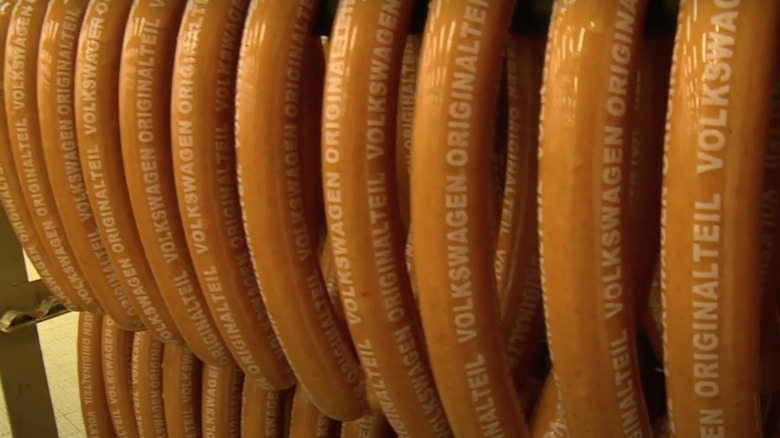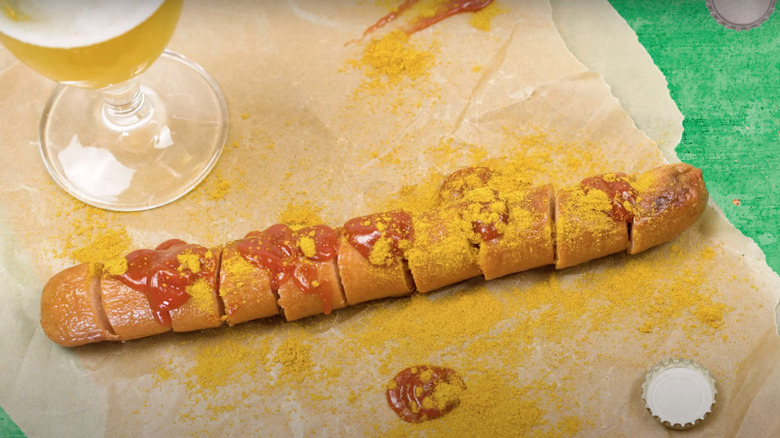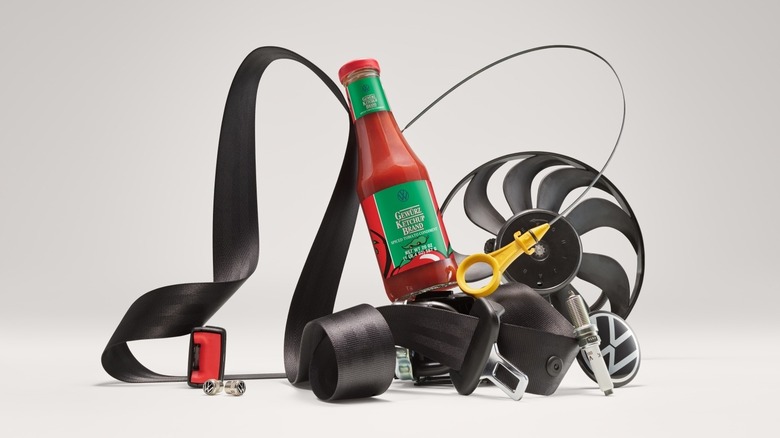The Unexpected Breakfast Item You Might Not Know Volkswagen Makes
Made in its Wolfsburg plant, the Volkswagen currywurst has been on the menu since 1973–around the same time, the German carmaker released another long-lasting icon, the Volkswagen Golf. Initially sold in its cafeteria, the currywurst sausage has slowly penetrated Volkswagen dealerships and other establishments, as well as grocery stores with the name Volkswagen Originalteil or "original parts". Aside from the time that it was struck off the menu in 2021, the famed sausage became a source of pride for the legacy automaker in the midst of turbulent financial times. At the time, Volkswagen was trying to reduce meat-based food but bowed to the relentless demand and returned it to the menu two years later, according to The Times. The cultural impact was so palpable that The Guardian even reported that it escalated into German Chancellor Gerhard Schröder getting involved.
In 2024, The Future Media shared that Volkswagen sold over 8.5 million sausages. While this number is extraordinary in itself, it's also shy of about half a million from the number of cars they rolled out in the same timeframe. But even more so when you take note that there were even years when they made more sausages than cars entirely. To know more about this unique Volkswagen legacy, here is how they are made, what makes them different, and the role they play (and might play in the future) within Volkswagen's overall brand strategy.
Volkswagen's sausage evolution
In general, the Volkswagen sausage hits three different marks: a reliably good meal for its factory workers, a steady income source to help subsidize staff meals and a unique branding effort. Similar to its car manufacturing practices, Volkswagen has slowly refined its sausage-making process throughout the decades, which includes a change in recipe and suppliers. By 2010, Autocar shared that wheat-based vegan currywurst was also on the menu, which added a bit of inclusivity for Volkswagen's vegan staff. On a quirky note, Volkswagen sausages also have their own part number, similar to those it has for its vehicles: 199 398 500 A. So, how do you even get to eat it?
Unfortunately, it's not possible to regularly get currywurst sausages from United States retailers. Due to strict local import restrictions, a 2018 National Post report revealed that the sausages that were sold in the United States didn't have exactly the same ingredients as the ones available in Europe. So, if you want to taste the real stuff, you'll need to make a pilgrimage across the ocean.
While this may feel a little out of reach for some people, there's still hope that you can taste Volkswagen-branded food in a bottle since it also added ketchup to its lineup. With its own dedicated part number (00010 ZDK-259-101), Volkswagen launched a special limited-edition release of its VW Gewürz Ketchup Brand in the United States to coincide with its 75th anniversary in 2024.
Volkswagen's food story: an ode to its commitment to its people and innovation
While it can feel a little like an inside joke, Volkswagen's dabble into the food industry does reveal a few interesting things. First, at its core, it cares about innovating, which goes beyond its manufacturing experience and breeds into other areas of its operations. Second, it recognizes that the experience of its factory workers matters, even as simple as providing them with a satisfying meal. Third, Volkswagen keeps its eye on opportunity sharp, which shows its commitment to diversifying its business. One can speculate that even if it sounds a little "off brand," Volkswagen can survive because it knows how to listen to its customers and follow the money.
While many still recognize Volkswagen as a car manufacturer, only time (and maybe increasing demand for sausages) will tell whether it will ever go all-in into gracing our bellies. After all, many of the other great car companies sell items that aren't cars, and many of them started by doing something else, so it's not entirely out of the realm of possibility for it to happen the other way. For example, Japanese brands Suzuki and Toyota have histories rooted in textile manufacturing. While one of the oldest car brands in the world, French manufacturer Peugeot initially produced things like pepper grinders, which you can even take home today. Who knows, maybe other companies will take a page out of Volkswagen's book, and we'll be able to find more automaker brands in our supermarkets closer than we think.


